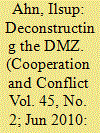| Srl | Item |
| 1 |
ID:
097795


|
|
|
|
|
| Publication |
2010.
|
| Summary/Abstract |
The Demilitarized Zone (DMZ) has been a global symbol of perpetual conflict, hatred and distrust since its establishment in 1953 after the Korean War. The 155-mile ceasefire line has given birth to moral pathologies in the minds of Korean people that include 'otherness is evil', 'containment of war is peace' and 'restoration of the same is unification'. The purpose of this article is to reduce these moral pathologies through Jacques Derrida's deconstructive approach and Emmanuel Levinas's ethics of the Other. Through tripartite reduction of these moral ideologies of the DMZ, an ethical thesis is developed that peace is not a mere state of the absence of war, but rather a welcoming of radical others and differences. It is also argued that unification is not about restoring the same 'original we', but about co-reconstruction of the 'democratic we'.
|
|
|
|
|
|
|
|
|
|
|
|
|
|
|
|
| 2 |
ID:
127761


|
|
|
|
|
| Publication |
2014.
|
| Summary/Abstract |
All too often narrowly focused on the issue of perceived North Korean abuses, human rights on the Korean peninsula should rather be understood against the militarized legacies of national division, a history in which the United States has played no small role. Rather than isolate one or the other of the two Koreas for censure, this article identifies the hostile mutual interdependence of North Korea and South Korea as a starting-point for understanding human rights in both north and south. Arguing for a comprehensive human rights approach, this analysis demonstrates that the military expenses and militarized tensions on either side of the DMZ as well as the conscription of South Korea to the neo-cold war agenda of the United States within the Asia-Pacific region infringes on the Korean peoples' right to peace. Positing "Korean human rights" as an alternative framework that aims at once to abolish militarism and to improve human rights through peaceful, cooperative, and constructive means, this article contends that any genuine solution to human rights issues on the peninsula entails more than a unidirectional critique. Durable solutions require critical self-reflection and collaboration on the part of both Koreas.
|
|
|
|
|
|
|
|
|
|
|
|
|
|
|
|
| 3 |
ID:
153508


|
|
|
|
|
| Summary/Abstract |
This study investigates the consequences of sudden regime changes in North Korea.
The study considers how large volumes of refugees would affect South Korea and
other neighboring countries. It also proposes likely countermeasures for South
Korea and its allies. If sudden regime change in North Korea were to lead to largescale
refugees entering China, Russia, Japan, and South Korea; it could bring
massive changes in the balance of power in Northeast Asia. A refugee crisis of this
magnitude demands meticulous planning to minimize unexpected consequences
to the region. This paper examines the following questions: What is the decisionmaking
process that refugees undergo when deciding to leave North Korea? What
would be the volume of North Korean refugees heading into China, Russia, and
Japan? What would be the volume of refugees entering South Korea? What would
be the most likely routes taken by refugees? This study analyzes these questions and
suggests policy implications for the South Korean government.
|
|
|
|
|
|
|
|
|
|
|
|
|
|
|
|